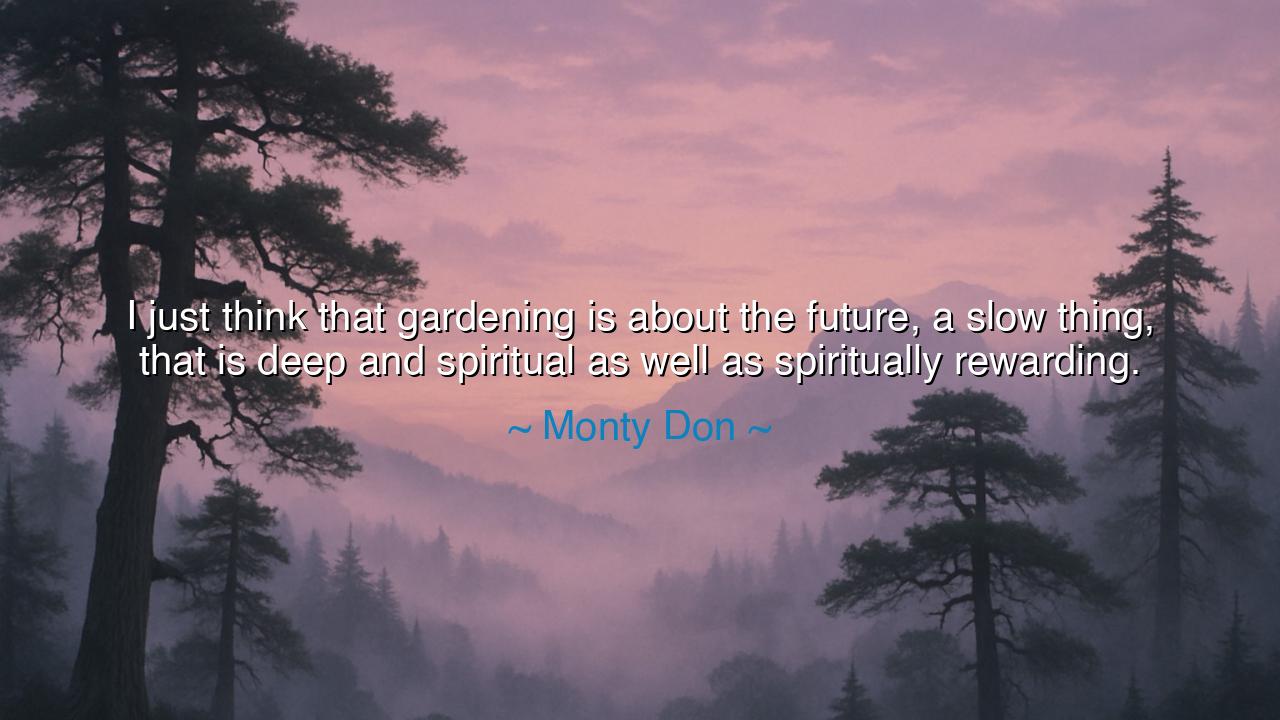
I just think that gardening is about the future, a slow thing
I just think that gardening is about the future, a slow thing, that is deep and spiritual as well as spiritually rewarding.






“I just think that gardening is about the future, a slow thing, that is deep and spiritual as well as spiritually rewarding.” Thus spoke Monty Don, the beloved gardener-philosopher of our time, whose words carry not only the wisdom of soil and seed, but the eternal language of patience, hope, and faith. In this simple reflection lies an ancient truth: that gardening is not merely the cultivation of plants, but the cultivation of the soul. It is an act that unites the body with the spirit, the present with the future, and man with the eternal rhythms of the earth.
The origin of this quote comes from the life of a man who has walked through both beauty and sorrow, and who found in the garden his place of healing. Monty Don, through years of tending the earth, came to see gardening not as a hobby, but as a sacred dialogue with time itself. In his words, “a slow thing,” he captures the very essence of what modern life has forgotten — that all things of true worth grow slowly, in quietness and care. The gardener cannot command the seasons; he must learn to wait, to trust, to labor today for what will bloom months or years hence. Thus, gardening becomes a practice of faith, a ritual that keeps the soul tethered to hope.
To say that gardening is “about the future” is to understand that every seed planted is a promise. When a gardener presses a seed into the soil, he does so not for the present, but for a tomorrow he may never see. In that act, he declares his belief in continuity, in life beyond himself. The gardener’s reward is not instant; it is cumulative and unseen, unfolding like time itself. This is what makes gardening both spiritual and deep — for it teaches that the future is not built through speed or force, but through steady care, through trust in invisible growth, and through surrender to the mysterious will of creation.
The ancients, too, revered this truth. The philosopher Cicero once said, “If you have a garden and a library, you have everything you need.” For to garden is to participate in both wisdom and eternity. The Egyptians built their temples beside cultivated lands, believing that growth was divine; the Romans tended their household gardens as acts of balance between nature and civilization. Even the monks of the medieval cloisters, who lived lives of prayer and contemplation, spent their days among herbs and flowers — understanding that to till the earth was itself a form of prayer, a dialogue between man and the Creator. They knew, as Monty Don knows, that the act of gardening nourishes both the soil and the soul.
Consider the story of Vita Sackville-West, the poet and gardener who created the gardens of Sissinghurst in England. In the shadow of war and personal turmoil, she found peace among her roses, her lavender, and her climbing vines. To her, as to Monty Don, the garden was not merely a retreat, but a declaration of life in the face of impermanence. She once wrote that a garden is “always a series of losses set against a few triumphs,” and yet she planted again each spring, believing in the renewal that follows decay. Her faith was not blind; it was cultivated, watered by patience and rooted in the deep knowledge that from every ending, something new will rise.
In Monty Don’s words, gardening is not just “spiritually rewarding” — it is a mirror of the inner life. To garden is to confront the truth of existence: that all things die, and yet all things return. It is to learn humility before nature’s rhythms, to know that the gardener does not control, but cooperates. It is a labor of surrender and gratitude, where each act of planting is both an offering and a prayer. Those who practice this art begin to see the world differently. They learn to measure time not by minutes or hours, but by seasons and cycles — to find beauty not in perfection, but in growth, decay, and rebirth.
Therefore, my child, learn from this wisdom: embrace the slow work of life. Plant seeds not only in the ground, but in your relationships, your craft, your dreams. Do not rush their blooming; tend them with patience and faith. When the world demands speed, answer it with stillness. When life feels uncertain, go to your garden — literal or spiritual — and remember that all creation unfolds in its appointed time. Let your work be like gardening: steady, hopeful, and full of care for the generations to come.
For as Monty Don teaches, gardening is about the future — and so too is living. Every kind word you speak, every act of love, every dream you nurture, is a seed that will one day grow beyond your sight. Tend your life as you would a garden: with humility, gratitude, and reverence. In doing so, you will find not only beauty in the world, but peace in your own heart — a peace that, like the garden itself, is deep, spiritual, and forever rewarding.






AAdministratorAdministrator
Welcome, honored guests. Please leave a comment, we will respond soon